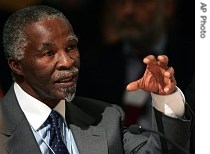2007年VOA标准英语-South Africa's Mbeki Pledges to Fight Poverty,(在线收听)
Johannesburg
09 February 2007
South African President Thabo Mbeki has pledged to create more jobs, improve social services, fight crime and combat AIDS in a wide ranging State of the Nation address. Mr. Mbeki delivered the speech Friday in Capetown at the opening session of the South African parliament. Correspondent Scott Bobb reports from our bureau in Johannesburg.
 |
| Thabo Mbeki |
"None of the great social problems we have to solve is capable of resolution outside the context of the creation of jobs and the alleviation and eradication of poverty," Mbeki said.
He said these problems include the improvement of health, reducing crime levels and raising literacy and education levels. As a result, he said poverty eradication will continue to be a central part of the efforts to build a new South Africa.
Mr. Mbeki noted that South Africa's economy has grown at an annual rate of nearly five percent in recent years and has created 1.5 million new jobs. The government has also built thousands of homes and improved transportation and social services for the poor.
He said his government has been cited by the United Nations as one of the few that spend more on water and sanitation than on its military.
The government has come under rising public criticism in recent weeks for South Africa's high crime rate and the president added to the debate last month when he said crime is not an issue for the majority of citizens.
However in his speech Friday, Mr. Mbeki appeared to acknowledge the public distress.
"Decisive action will be taken to eradicate lawlessness, drug trafficking, gun running, crime and especially the abuse of women and children," he said.
He pledged to expand the police force by more than 10 percent in three years and strengthen investigation, prosecution and civilian crime prevention organizations.
For the first time since 2001, when he questioned whether HIV causes AIDS, Mr. Mbeki expressed a strong commitment to fighting the disease that afflicts more than 10 percent of his people.
"Government commits itself to intensify the campaign against HIV and AIDS and to improve its implementation of all elements of the comprehensive approach such as prevention, home-based care and treatment," he said.
Mr. Mbeki also pledged to sustain a recently established partnership with AIDS activists and donor groups and to implement a more vigorous anti-AIDS strategy under development by this new group.
Some opposition members, like Patricia De Lille of the Independent Democrats party, expressed satisfaction with Mr. Mbeki's position on crime.
"For the first time now, he [Mbeki] has acknowledged that crime is a problem, especially violent crime against women and childre," she said. "And having acknowledged that we need leadership now from the president to make that priority number one."
The leader of the largest opposition party, Tony Leon of the Democratic Alliance, approved of Mr. Mbeki's extensive proposals to reduce crime.
"But I thought the president's response was odd in that he didn't give the sort of passionate leadership that I think people are looking for," he said. "He sort of had a bureaucratic response."
The opposition leader noted that major issues such as crime and AIDS have been addressed in previous speeches but concluded that they must be given higher priority in order to be implemented and not sidelined by other problems.